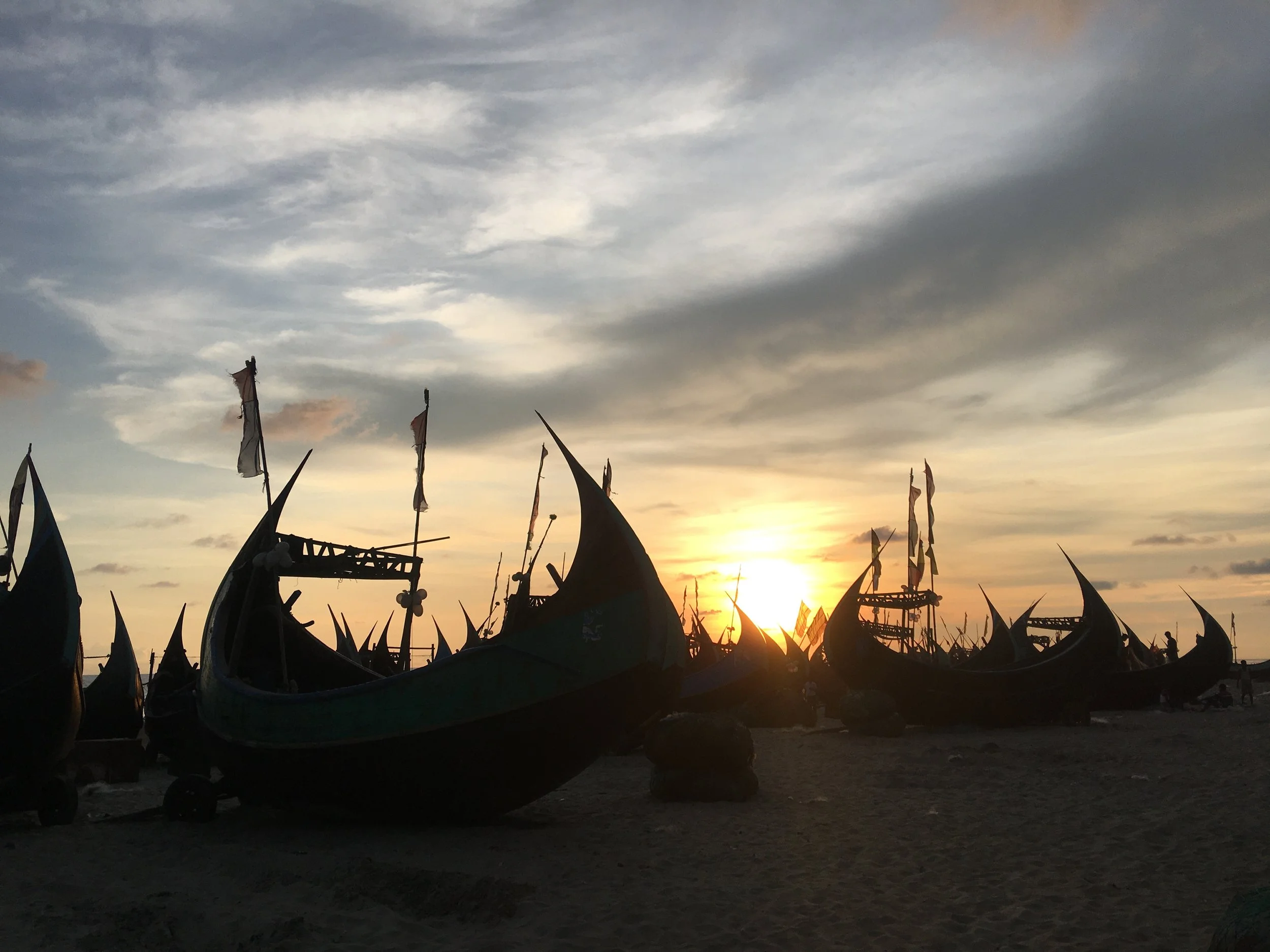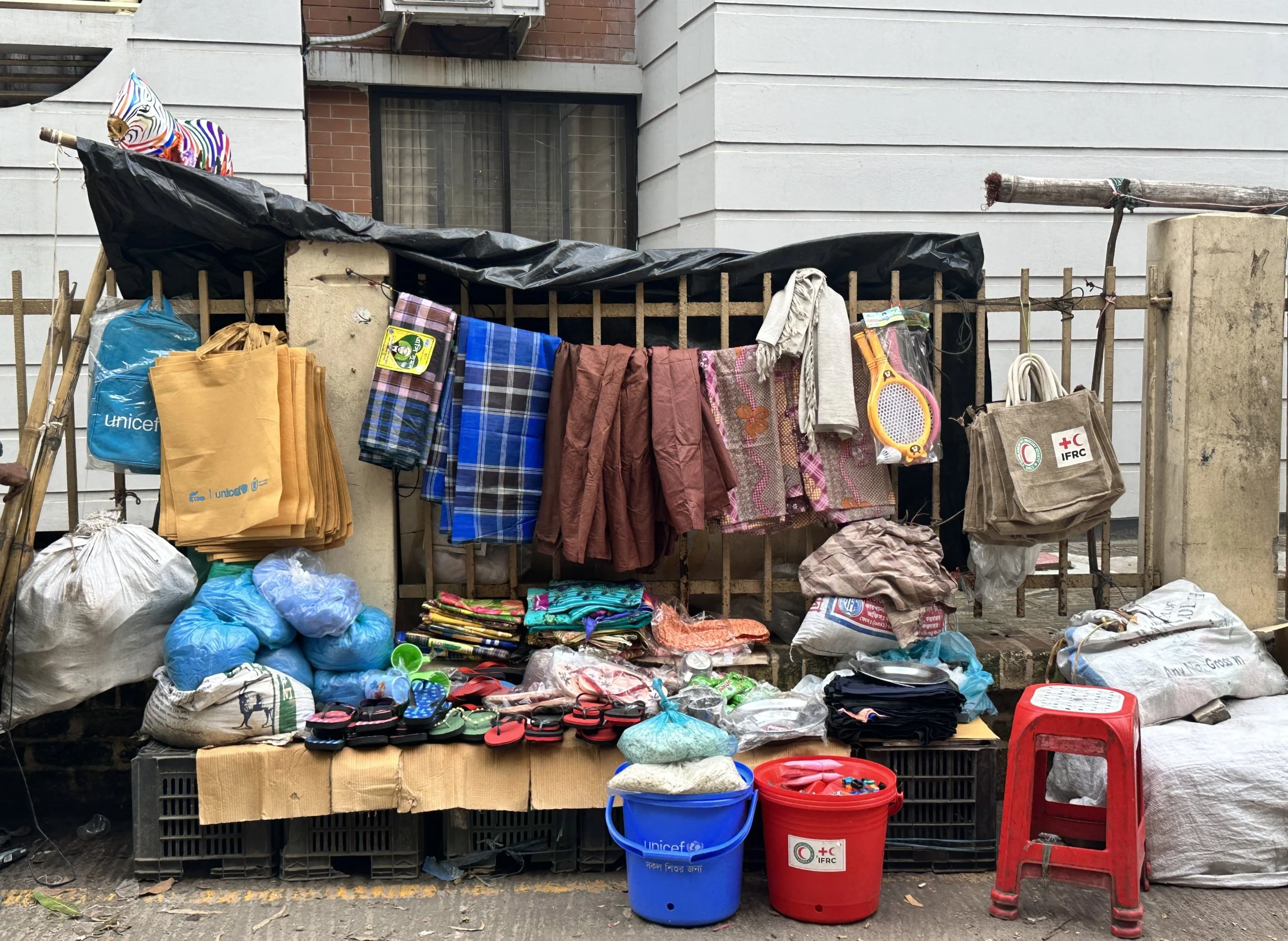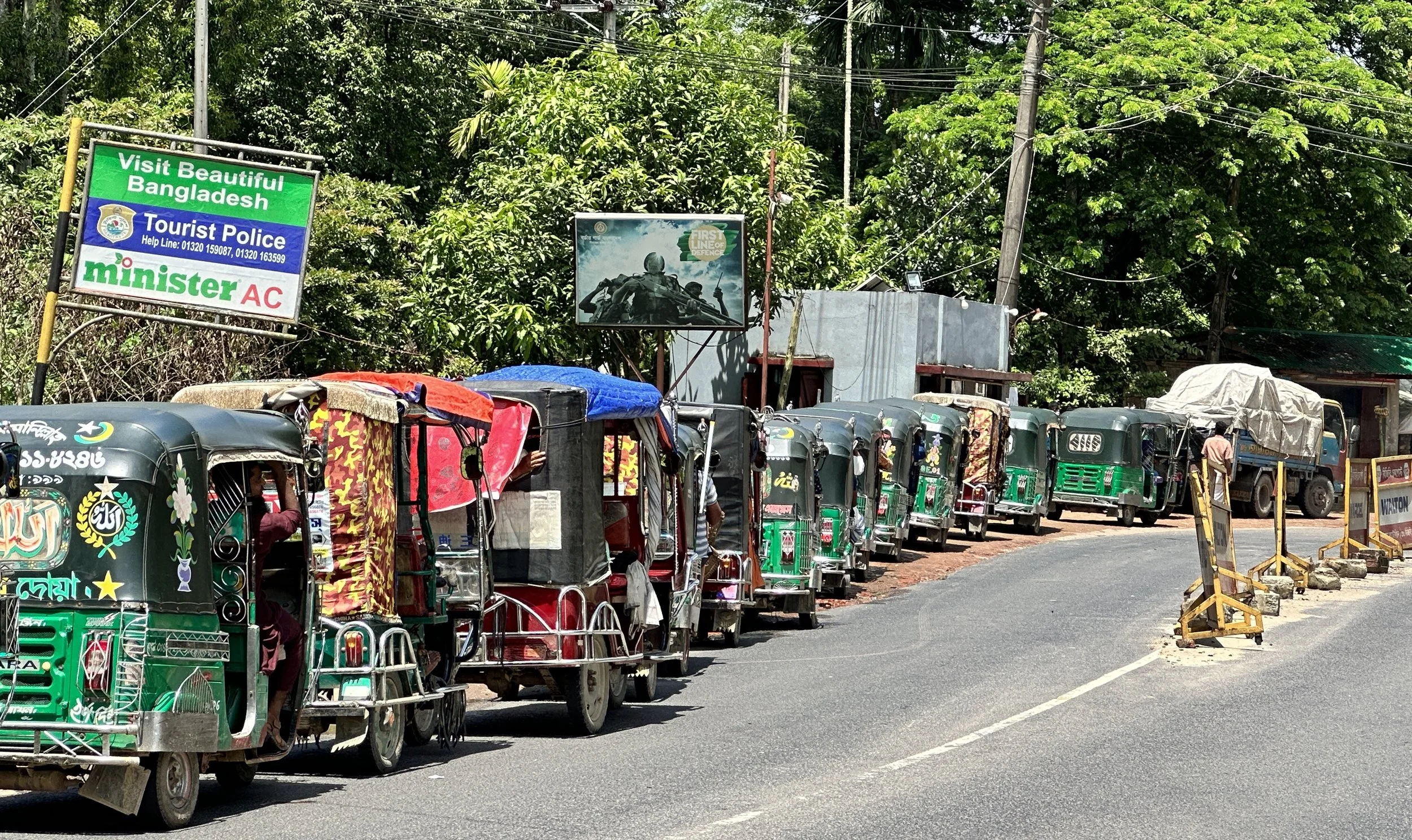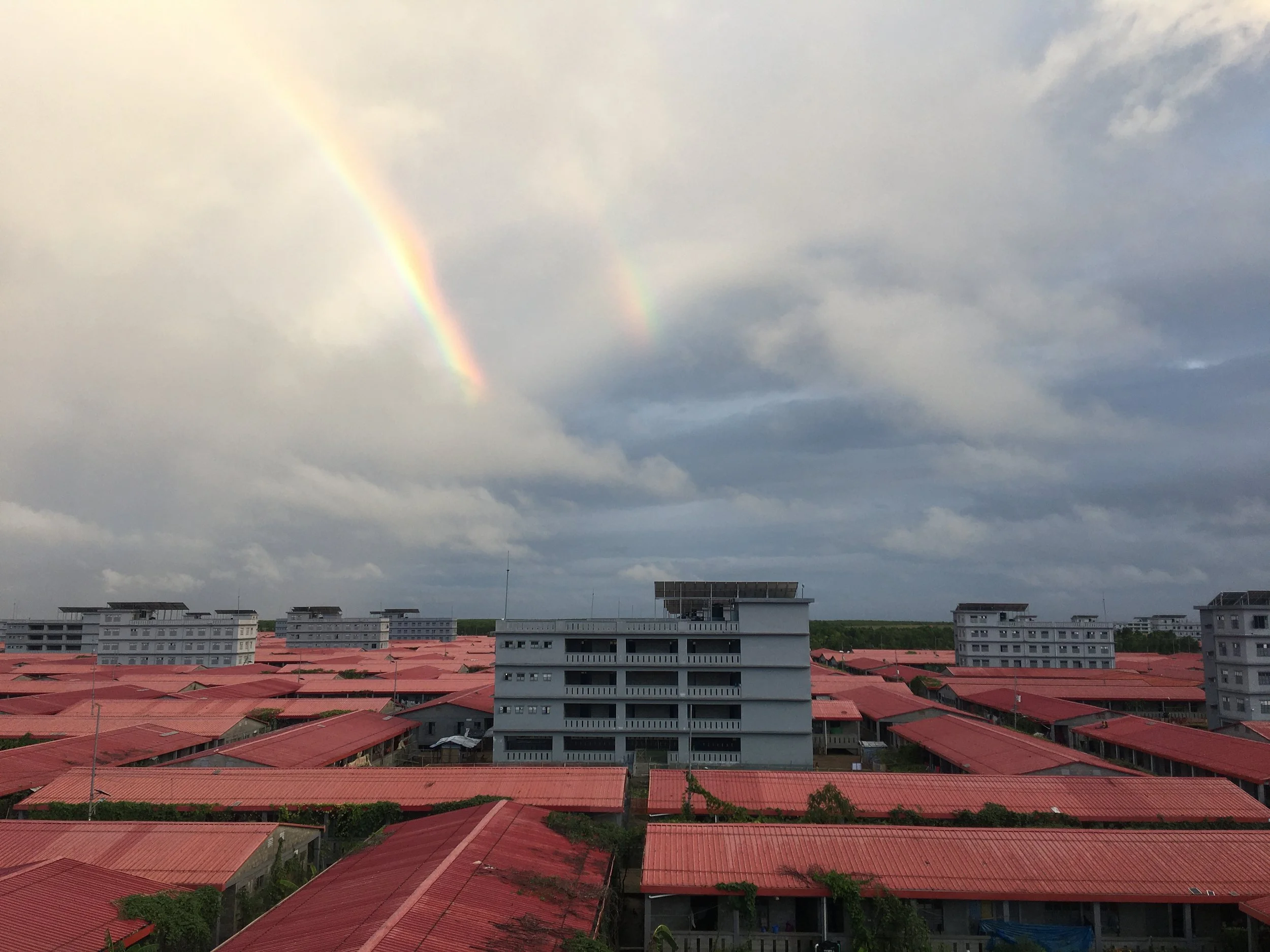
Migration | Borders | Belonging
Ongoing Research:
“Refugee Habitats: Producing and Maintaining Displaceable Rohingyas in Bangladesh”
-

Refugee Camp: Spatial paradox of Care and Containment
In Kutupalong, the world’s largest refugee camp, care, and control coexist in stark tension. Barbed-wire fences encircle the camp, turning it into a carceral space where the state enforces immobility and separation. Yet within these confines, humanitarian aid organizations construct roads, shelters, and systems of care, shaping a space where survival and resilience flourish amid restriction. My research explores this paradox—how a space meant to offer refuge also becomes a mechanism for containment, and how refugees resist and reshape their environment in response to these dual forces of power.
-

Aid Urbanism: Fringes of Uneven Development
The coastal city of Cox’s Bazar has been transforming unevenly to accommodate the humanitarian workers and the informal urban refugees. While the city embraces infrastructure development to cater to the needs of aid organizations, the urban refugees’ survival is fraught with precarity and everyday navigation through surveillance structures. I conceptualize the process as “aid urbanism” that reshapes the city for global workers while refugees face exploitation and systemic violence. Working closely with both groups, I reveal how urbanization and masculinity intersect and the city becomes a site of intimate conflict and unexpected solidarities. In Cox’s Bazar, boundaries between citizens and refugees blur, disrupt, and reform.
-
Architecture of Isolation: Bhasan Char Island
My ethnography in highly securitized Bhasan Char frames it as the spatial embodiment of state-enforced isolation. Here, infrastructure serves as both a tool of governance and a mechanism of territorial exclusion. Framed as a long-term solution, this remote island is a site that emerges from political abandonment and ecological precarity that exemplifies the conditions of refugees living across the world and not only the Rohingyas. Yet, the everyday resilience and transient moments of cooperation across class and citizenship imply the struggle for a more just world.
-

Tracing the Displacements through Time
Understanding the present “refugee crisis” demands looking into the past. My archival research uncovers colonial and postcolonial records—government orders, newspapers, immigration documents, and oral histories — to reveal how historical mobilities and territorial governance have evolved. By tracing the entangled histories of mobilities and displacement in the Bay of Bengal, I situate the current crisis within a longer continuum of state-led exclusions, forced migrations, and contested identities. This work historicizes today’s crisis and challenges static narratives of refugeehood, posing it as a dynamic process embedded in regional and global histories.
-

Methodology: A Note
My multi-sited, multi-method approach follows the rhythms of life across the camp, city, and island. Moving alongside the refugees, local residents, government officials, and aid workers enabled me to uncover the complex human-environment relationships that define these spaces collectively. Through conversations in motion—on rickshaws, shared scooters, and crowded buses—I traced the fluidity of mobilities that shape both the refugees’ lived realities and the landscapes they inhabit. These fleeting yet profound encounters directed ethnographic understanding of resilience, survival, and connection. Repeated interactions culminated in completing over 200 in-depth interviews. My methodological approach frames displacement as navigated not just in fixed places but in the spaces between them. Coupled with archival research, visual analysis of photographs and digital media, and systematic integration using MAXQDA, my work bridges past and present to explore the spatial forces of mobility and containment.
Upcoming Conference:
2025:
Session Organizer and Presenter for the Annual Meeting of the Association of American Geographers, Michigan (March 24-28, 2025). “
Session title: Reimagining South Asia: Political Violence, Displacement, and Regional Futures”
Paper title: Crossing Borders, Carrying Violence: Rohingya Displacement through Memories and the Spatial Pursuit of Belonging
Conference Presentations:
2024:
“Bordering through Island: Rohingya Refugees’ Political and Ecological Carcerality in Bhasan Char, Bangladesh” as a paper presenter for the session “The Permanent Temporary: Borders, camps, and Categories II” at the Annual Meeting of the American Association of Geographers, April 17.
2023:
“The Interconnected Spaces of Producing Refugeehood of the Rohingyas in Bangladesh” as a paper presenter for the session “Legal Geographies, Crime, and the Space of the Camp” at the Annual Meeting of the American Association of Geographers, March 25
“Utopia of Hope at Bhasan Char Island: Rohingya Refugees’ Political and Ecological Carcerality in the Nation-State’s Extension” as a presenter for the session on “Borders, Carceral State, and Securitization” at the 2023 Political Geography Specialty Group’s Preconference, University of Colorado at Boulder, March 22
2022:
“Spaces of Rohingya refugeehood in Bangladesh: Camp, City, and Island,” as a paper presenter for the session on “Identity and Immigration” at the Conference by the American Institute of Bangladesh Studies, University of Texas, Austin, November 5
2021:
“The City and the Camps: Production of co-constitutive spaces & practices in Cox’s Bazar, Bangladesh,” as a paper presenter of the session on “Refugees and the Right to the City: perspectives from the Global South (Part I),” American Association of Geographers Annual Meeting (virtual) April 10
2020:
“Embodied Borders: Remaking of Cox’s Bazar as A Response to the Influx of Stateless Rohingyas” as a paper presenter of the session on “The Borders of Citizenship and Citizenship of/in the Border,” Annual International Conference of Royal Geographical Society and Institute of British Geographers in London, UK. [postponed due to the pandemic caused by COVID-19]
“Whose Voice Counts?”: Limited Sustainability in The Rohingya Refugee Camps, Bangladesh” as a panelist in the session on “The role of human mobility dealing with violence and conflicts,” 34th International Geographical Congress in Istanbul, Turkey. [postponed due to the pandemic caused by COVID-19]
2019:
“Rohingya Refugees in the Borderland: Rethinking State Sovereignty of Bangladesh”, a symposium on Bangladesh’s Recent Past and Immanent Future at 48th Conference on South Asia, Madison, October 16
2018:
“Determinants of Coproduction and Collective Action Strategies in Four Low-Income Settlements of Dhaka, Bangladesh,” Annual Meeting of the Association of American Geographers, New Orleans, Louisiana, April 14
2017:
“Claiming and Realizing Right to Land: Can Development Organizations address the gender disparities in Bangladesh?” Land and Poverty Conference 2017: Responsible Land Governance—Towards an Evidence-Based Approach, The World Bank, Washington D.C., March 27
Research Outputs:
Peer-reviewed articles:
Wahab, S. 2022. Hybrid Governmentality in Practice: Territoriality and Biopolitics in the Rohingya Refugee Camps in Bangladesh. Political Geography, Vol 94, https://doi.org/10.1016/j.polgeo.2021.102568
Wahab, S. & Ashutosh, I. 2022. Displacing South Asia: Urbanization through Forced Migration. Annals of the American Association of Geographers, Vol 112, Number 2, https://doi.org/10.1080/24694452.2021.2023001
Jahan, F., Rashid, M, & Wahab, S. A. 2015. The Role of Fatalism in Resilience to Food Price Volatility in Bangladesh. Institute of Development Studies Bulletin, v. 46. ISSN 1759-5436. Doi: http://dx.doi.org/10.1111/1759-5436.12187.
Encyclopedia Entry (forthcoming):
Wahab, S. “Hybrid Governmentality” in The SAGE Encyclopedia of Refugee Studies from Critical Refugee Studies Collective (Invitation accepted from Yen Espiritu, Distinguished Professor from University of California, San Diego). (Projected Publication Date: 9/16/2025)
Public scholarship:
Wahab, S. 2023. Refugees are living longer in exile than ever before, with complex consequences for them and their host communities. The Conversation. June 14. Available at https://theconversation.com/refugees-are-living-longer-in-exile-than-ever-before-with-complex-consequences-for-them-and-their-host-communities-204722
2024-25 John H. Edwards Fellowship, Indiana University (IU), ($25,000)
2023-24 Kovener Teaching Fellows program, Indiana University (IU)
2023-24 College of Arts & Sciences Dissertation Research Fellowship, IU ($22,000)
2023-24 American Institute of Bangladesh Studies (AIBS) Graduate Student Research Fellowship ($3000)
2023 William Black Leadership Award from the Department of Geography, IU ($700)
2022 Graduate and Professional Student Government’s Research Award, IU ($1000)
2022 Graduate Research Grant, Department of Geography, IU ($2500)
2022 Dhar India Studies Summer Research Grant, IU ($2500)
2022 Tobias Center for Innovation in Development Research Grant, IU ($2300)
2021 Conference Travel Award, American Association of Geographers’ Urban Geography Specialty Group, IU ($150)
2020 Runner-up, American Association of Geographers’ Asian Geography Specialty Group sponsored Graduate Student Paper Competition ($150)
2020 Tobias Center for Innovation in Development Research Grant, IU ($4500)
2020 Chair's Graduate Student Recognition Award, Department of Geography, IU
2019 Dhar India Studies Travel Grant, IU ($500)
2019 Summer Research Fellowship, Department of Geography, IU ($3500)
2018 3rd Place and People’s Choice (Master’s Category), 3 Minute Thesis (3MT), Ohio University ($200)
2017 Champion team, Startup Weekend Athens, Ohio
2016 Top Ten team, Scripps Innovation Challenge, Ohio University ($250)
2015-17 Fulbright Foreign Student Program Grant from U.S. Department of State, USA (the scholarship covered a fully funded two-year master’s degree at Ohio University with stipend, health insurance, and roundtrip airfare)

